Chinese Internet and software: about sore

The story of how the Internet looks, developing in isolation from the global network
I live in China and avoid the Chinese Internet: I visit a minimum of Chinese websites, I don’t use Chinese e-mail, I try not to install Chinese software on my PC and applications on my smartphone. The use of foreign services and sites is difficult because of the ubiquitous multi - level locks , which are more and more difficult to bypass .
Maybe I'm such a racist and hate China? Or I do not know the language? Or am I just a bad bore?
In the Chinese Internet and software, I am concerned about the quality , which includes design, functionality, performance, and attitude to the user , including his personal data.
')
Disclaimer:
- I do not blame the content sites. Content is different from Western, and it would be incorrect to blame the Chinese video hosting site for the absence of Celine Dion and the presence of Jackie Chan, even though this is a factor against “replacing” YouTube with Youku.
- I am not an expert on security or UX. But this does not deprive me of the right to criticize holes and bad designs.
- I love China and I feel good about the Chinese. Read to the end, there is light at the end of the tunnel.
0. Browsers
First, explain what browsers are used in China. Take a look at the statistics on the user agent for the PC:
- Chrome: 40.89%
- IE - 27.27%
- QQ - 6.37%
- 2345 - 4.96% - a wonderful browser with two engines at the same time: Chromium and IE
- Sogou - 4.54%
- Firefox - 2.09%
- Others - 13.88%
It would seem, and here Chrome holds the lead, if not for a couple of "but":
- Google is blocked in China completely, most of the population is not something that does not know how to bypass blocking, but has never seen Google;
- The popular browser 360 uses the user agent from Chrome and IE.
- In the rankings of Chinese browsers, 360 will be on the first one.
The conclusion is quite obvious: in China they use completely different browsers , the usual four of Chrome, Firefox, Internet Explorer and Opera here exist in much smaller shares.
If I had a virtual machine at hand, I would put each of these browsers in there and show screenshots of them, as well as all the garbage that comes with the bundle (“internet mail.ru” in a cube). And I feel sorry for my home / work cars.

Separately enjoy the creative approach to the logos at 365 and 2345
Mobile era
In China, 731 million users , 695 of them, including using the mobile Internet. PC-only users are vanishingly small, but Mobile-only is a whole generation. Many Chinese never had a computer, and familiarity with the Internet began with a smartphone, and there it remained.
Here are the top six popular mobile browsers in China. All Chinese :)
- UC Browser
- QQ Browser
- Baidu Browser
- 2345 Browser
- Cheetah browser
- Sogou browser
Google Chrome also appears at the end of the ranking, but perhaps because of the changed user agents.
1. Quality
Chinese websites and software are often objectively bad in terms of design and performance, and functionally just overloaded.
1.1 Design
The design of Chinese sites does not fundamentally change for decades: a lot of elements, five or six flash banners covering all content, a crazy combination of colors, density of information placement, and so on.
This is JD.com - one of the largest online stores of the 1.5 billion country:

You can go to Amazon, eBay and any other sites and compare the density of information per square centimeter on your own.
News sites are good too. Here is Sina News, for example. It is a pity that I do not have Flash, as planned by the designers there should fly two animated banners.
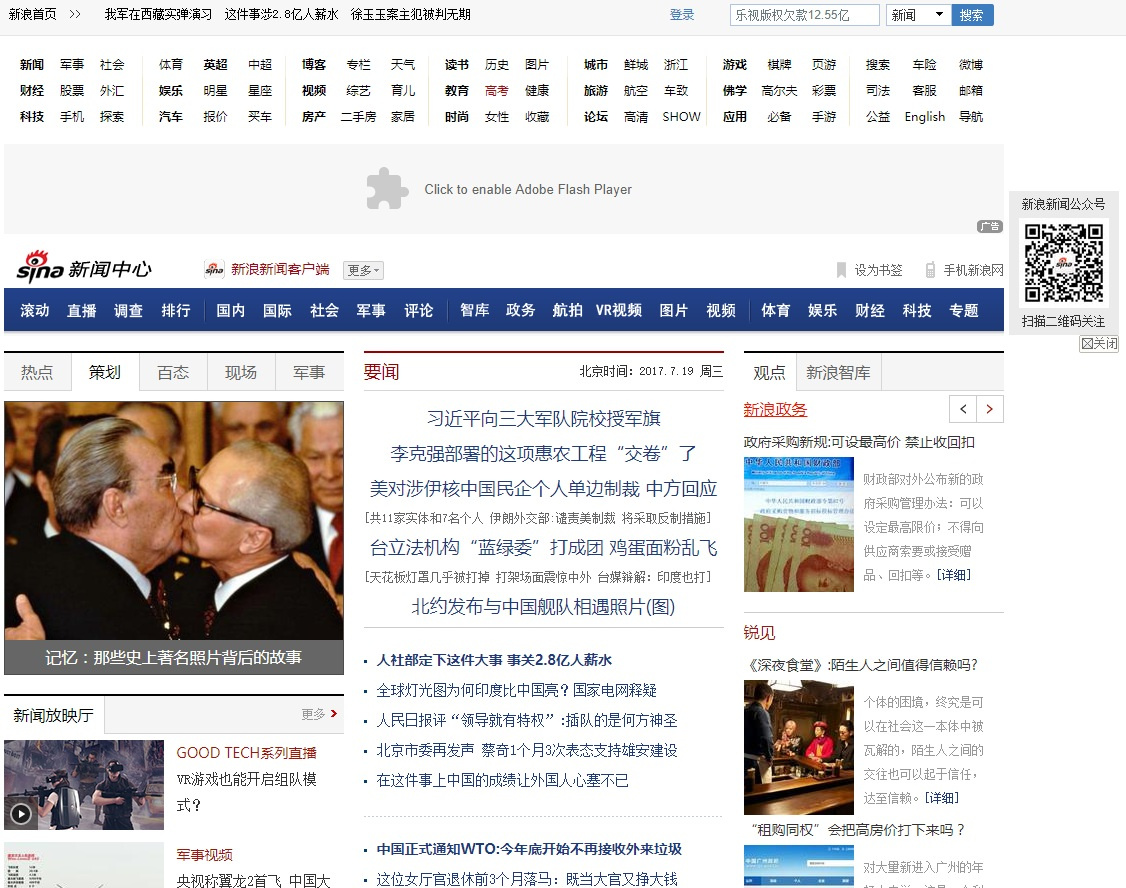 Yes, I know that mail.ru is just as scary, but this is no excuse.
Yes, I know that mail.ru is just as scary, but this is no excuse.But Ctrip , the most popular Chinese website for buying airline tickets. He has not only Chinese, but also a foreign version. See how strikingly different the design is:

Even on Habré there was an article about Chinese web design in 2013, and those covenants are honored to this day.
1.2 Functionality
Chinese apps and sites are overloaded with features. In every popular Chinese application, from a banking client to a messenger, in addition to its main function, you can:
- order food
- call a taxi
- buy movie, plane and train tickets
- to book a hotel
- play games
- to collect "points" (several parallel ball systems) and exchange them for "gifts"
- rent a bike
- scan the QR code
- view weather forecast
... and 10 more functions, the purpose of which I do not even guess.
I do not exaggerate and do not joke, for example, the main applications that I use every day are taken.
Here is an example of the same Taobao , the e-commerce giant:
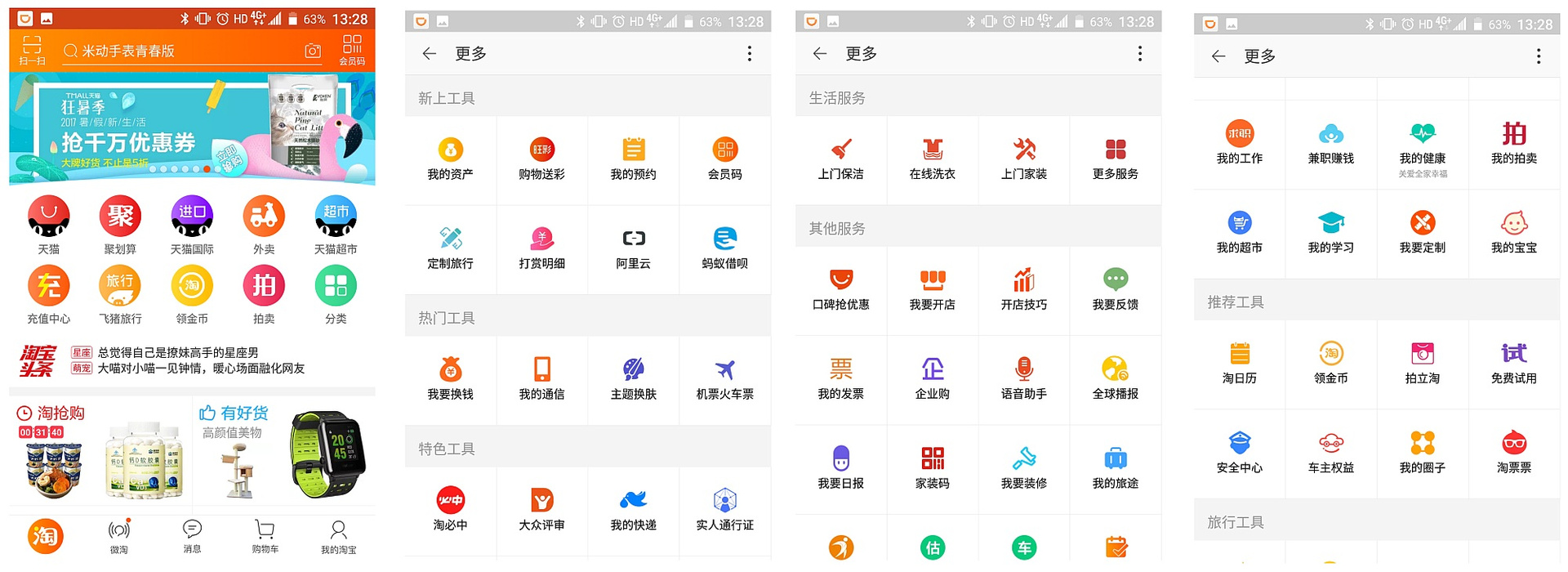
On these four screens there are applications:
- Tmall section
- section International Tmall
- Tmall Supermarket section
- Flash deals
- recharge your phone
- travel (hotels, tickets)
- auction
- cash deposits
- movie tickets
- booking services
- client virtual cards
- travel (others!)
- AliCloud (server technologies)
- bonus coins
- Alipay loan
- sale of used goods
- SIM card purchase
- railway and air tickets (others !!)
- restaurant reviews
- package tracking service
- the order of the cleaning lady
- laundry service order
- order repairman home
- food order
- section for opening a store
- complaints center
- lottery
- purchases for business
- voice assistant
- apartment repair order
- tour package (again! others!)
- work searches
- medical consultations
- online study
- Tmall supermarket (again)
- goods on trial (like "Freebie" at AliExpress)
- QR scanner
... and a dozen more sections, the functions of which I did not understand at all.
This is not all sections of the application.
But on the main page of the China Merchants Bank banking application the largest banner announces the sale of melons at 29.5 yuan per two kilos.
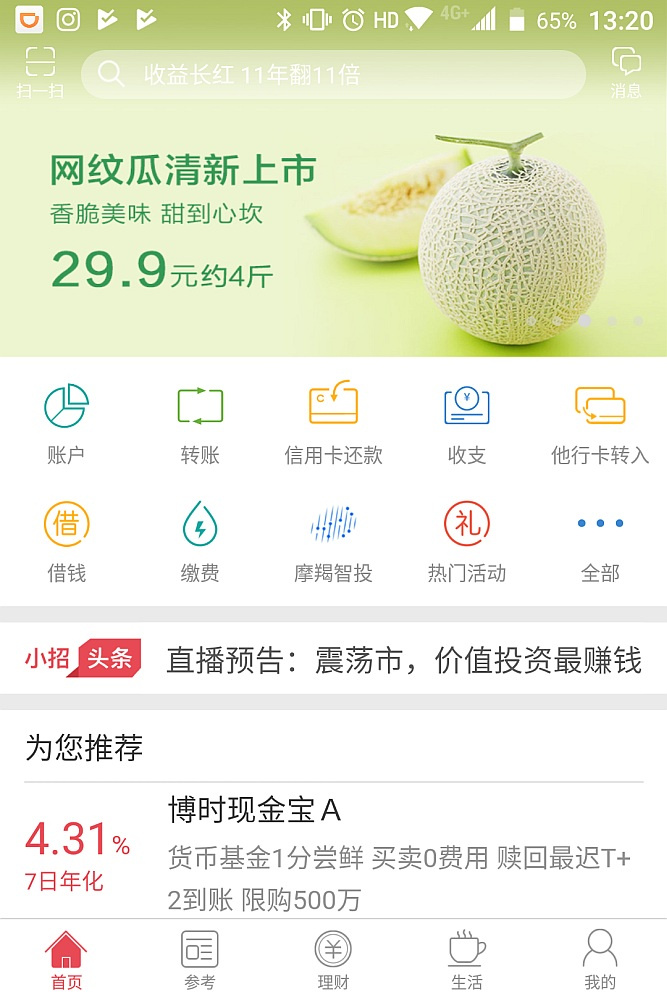
1.3 Performance
For the reason described above, Chinese applications weigh from 60 megabytes and run slowly even on top devices.
For example, the aforementioned Taobao , despite the work of hundreds of programmers, uses HTML5 everywhere instead of native code. The result - lags of 800-900 ms in ideal conditions (in real life - much more), hundreds of megabytes of cached files for a couple of days of work, eating away the battery. This is not a unique Taobao problem, but the norm for most popular Chinese applications.
1.4 Security
Chinese Twitter Sina Weibo , multi-million dollar audience. The main page with the login section of the account by name and password does not use https :
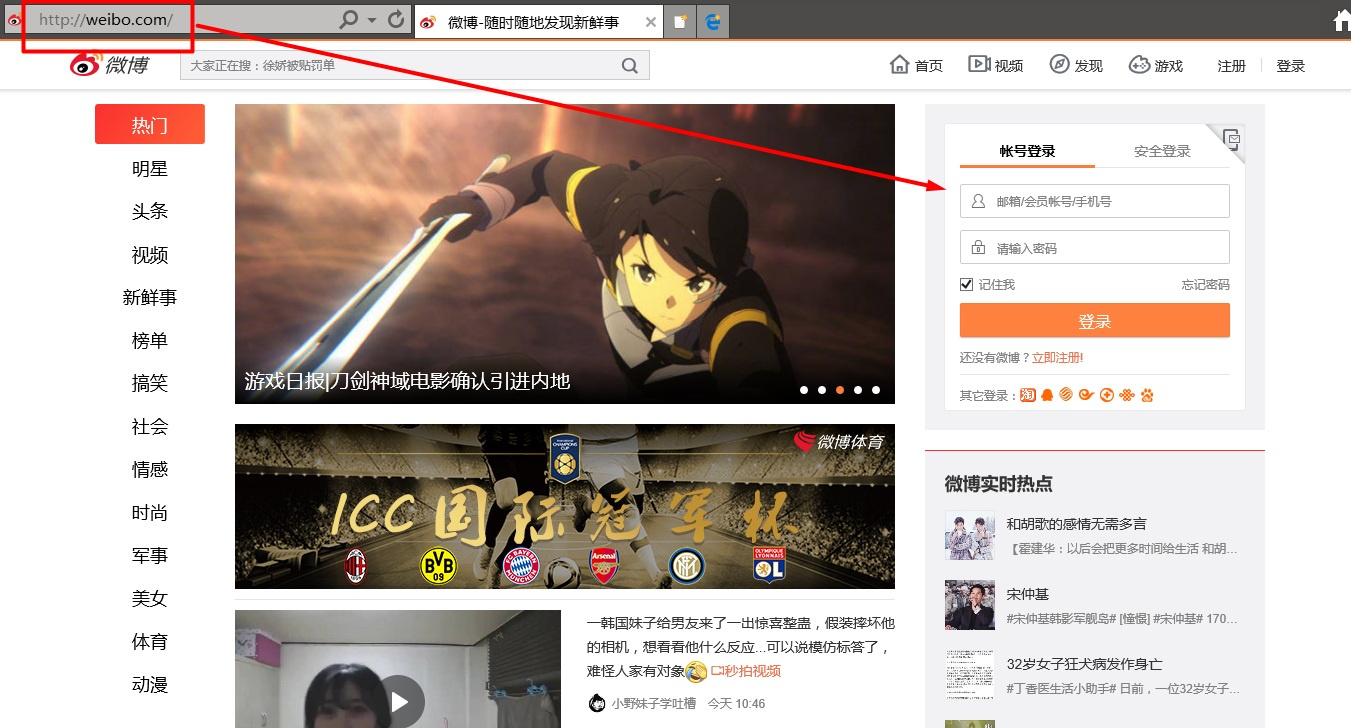
The memories of the stupid personal data of JD buyers, when he discovered the Russian direction, are still fresh. It’s enough to google “Chinese brand” + steal data.
Even the Chinese version of Skype (Skype-TOM), which replaced the usual Skype in China, did not just save all user conversations to their servers: the servers were protected to a minimum and private researchers got access to them without problems. And HTC kept the fingerprints in the clear in * .bmp.
I am not an information security specialist, but with each such case of trust in the Chinese Internet, less and less.
2. Attitude towards the user
2.1 Video Hosting
In China , youku, Sogou, iQiyi and Tudou are the most popular video hosting sites. Work only on Flash . Advertising from 50 (!) Seconds to two minutes (!!) at the beginning of every second video, you can not miss it, you must absolutely watch it completely. During this time, you look 2-4 ads of different brands.
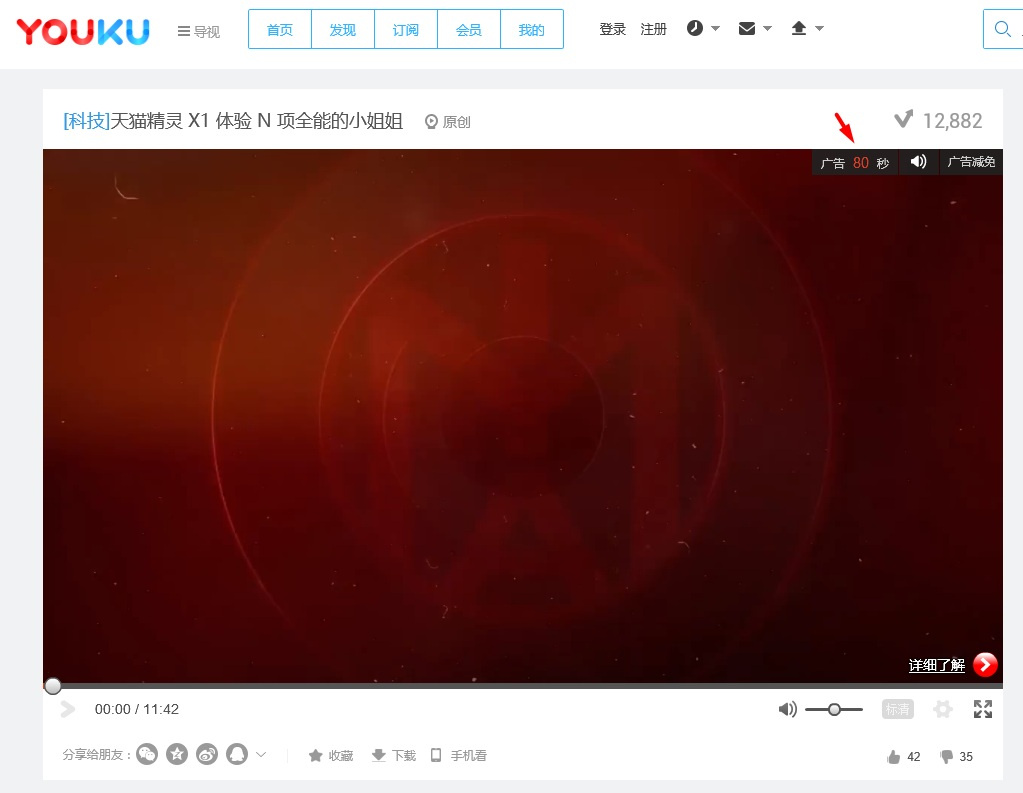
Of course, the content on these sites is much poorer than the big international YouTube, and is tied almost exclusively to China, so they still cannot “replace” their older brother.
By the way, enjoy the original Sogou Video logo:

2.2 Permissions on Android
Chinese applications request a shameless amount of permissions, and do not work if you refuse.
Example: the popular mapping application Amap .
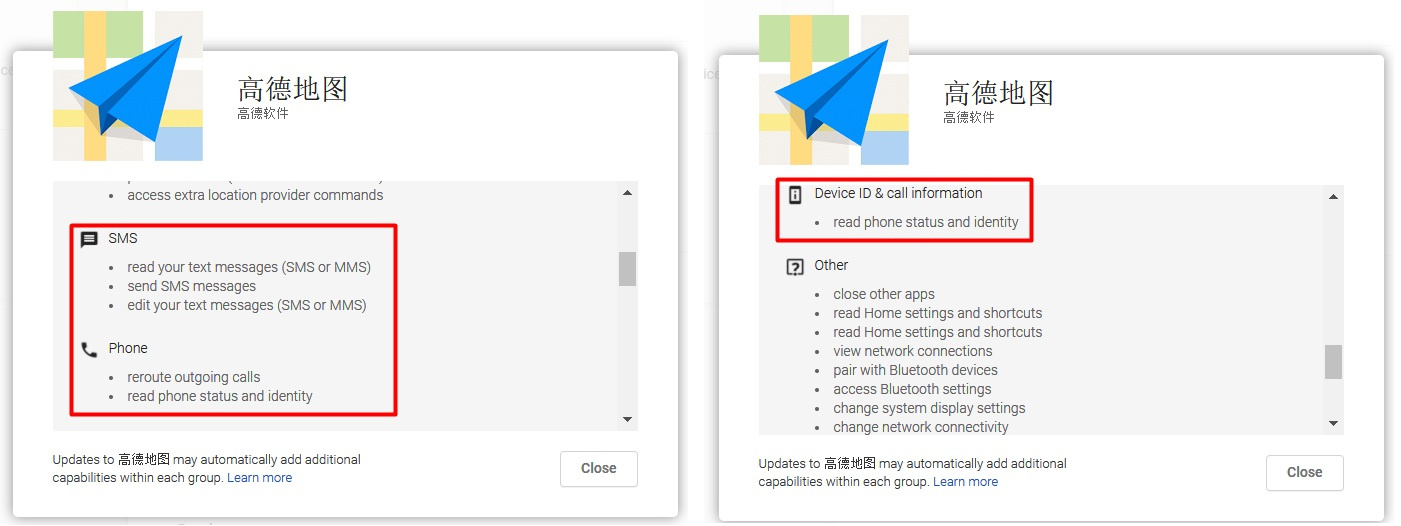
When you first start, in addition to accessing GPS (for location) and Storage (for storing offline map cache), it asks for Phone calls permission. Do you know what will happen if you refuse?
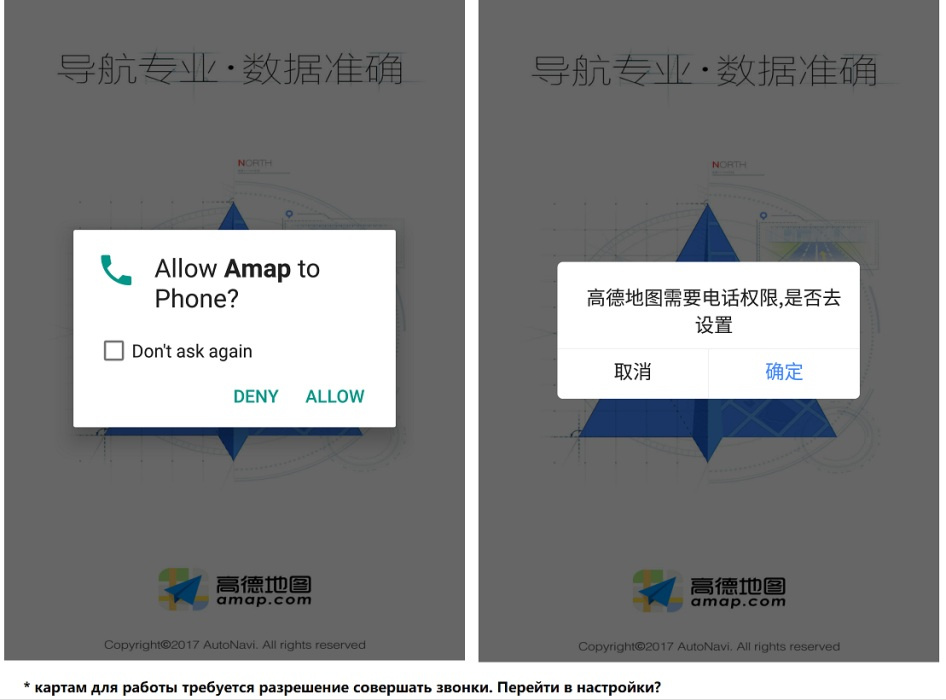
And off. Compare the number of permissions, for example, with maps from Yandex :
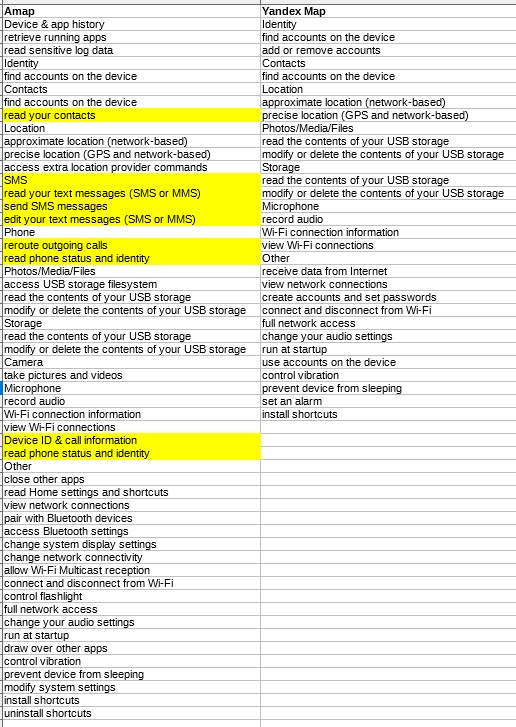
Similarly, for example, the built-in application "Gallery" in smartphones Xiaomi (MIUI system). Can you imagine why the "Gallery" calls? And if you refuse, it will not start.
I am not a developer for Android, but judging by the forums, this permission is used to identify the user by IMEI. Unfortunately, I am not ready to believe promises that developers will not make calls without my knowledge.
It would seem, why such applications exist in the market?
2.3 Markets and updates
The vast majority of Chinese Android applications are updated by simply downloading an APK from their site, often even via unencrypted http. This is because in China there is no generally accepted large market for apps like Google Play. There are dozens of small markets such as Douban , 360, Tencent, but it is literally dangerous to use them: their applications require all possible rights, and imperceptibly install new applications, games and other garbage, not to mention advertising.
Moreover, Chinese markets sin by stealing .apk files from other sites (of the same Google Play), replacing advertising grids with their own. Another trick is to change the version number in the manifest to “newer”, so that your existing applications can be “updated” to their revisions.
2.4 Censorship and Surveillance
These two sisters in China go hand in hand. You do not need to be a dissident to face it. They affect a huge number of services and applications.
The famous Evernote in 2012 created a separate Chinese division called 印象 笔记 [yinxiang biji] (“elephant notebook”).

But it's not just the name: all the servers of this new company are located exclusively in China. After opening, Chinese users were offered to move to a new service, because from China it worked much faster. True, now the notebooks became available for viewing by the Chinese security authorities. International Evernote in China is not blocked, but it works so fast that it is virtually impossible to use.
Last week, even Apple pulled up, and is already building a data center to store Chinese user data in the PRC .
And here is a fresh example of censorship: last week, messages from Emoji- “candle” were deleted from Chinese social networks. Even in this way, it was impossible to honor the memory of a dissident who died on the eve, whose name has not appeared in Chinese media and the Internet for more than ten years. And they even added neural networks that recognize “bad” images in personal chat rooms and delete them before they reach the addressee.
Examples of surveillance in China in general ( 100% of Beijing in the cameras ) and the Internet in particular are plentiful, just search on Google.
Life story: in 2011, I lived in a student dormitory in Shenyang, and I had the sense to “play” with the censors. I accidentally discovered that if in any search engine, including Yandex, to search for one Taichi sect or events on the square in the late eighties , even in Russian, the Internet would fall off for 10-15 minutes. Now I understand that I played with fire, but then it was fun.
Is there a ray of light in the dark kingdom?
What good is Chinese Internet?
Of course, not on the Internet as such, but in the digital sphere of Chinese life, thanks to which it is very convenient and comfortable to live. You can say this is the front side of the above coin.
Finance - Alipay
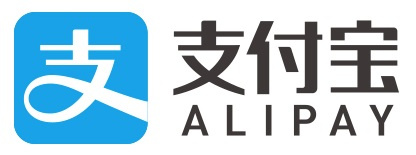
Alipay (支付 宝) is a financial platform from Alibaba. Originally created to process payments on Taobao, and in the mobile era it became just an indispensable application.
First, it allows you to quickly transfer money between individuals. The operation takes a few seconds, there is no commission when transferring (although there is 0.1% when withdrawing to a bank card).
Secondly, it is accepted in almost all stores and establishments, from the seller of garlic in the market to the real estate agency, from taxis to Starbucks, and even in soda machines.
Thirdly, QR and barcodes are used for payment: expensive NFC phones or terminals are not needed. Either you show the seller the phone, and he scans it, or you yourself scan the seller’s code and enter the amount to pay. Similarly, you can transfer money to any individual.
You can also buy a stake in the vending machine with the help of the sound-whisper :
In addition, other useful Alipay services are built right into the application: for example, you can take a micro-credit at a small percentage (3-5% per annum) for a few seconds, as well as use overdraft for any purchases for a month, with no interest at all . Of course, it all depends on your " credit rating ")
Finance - WeChat
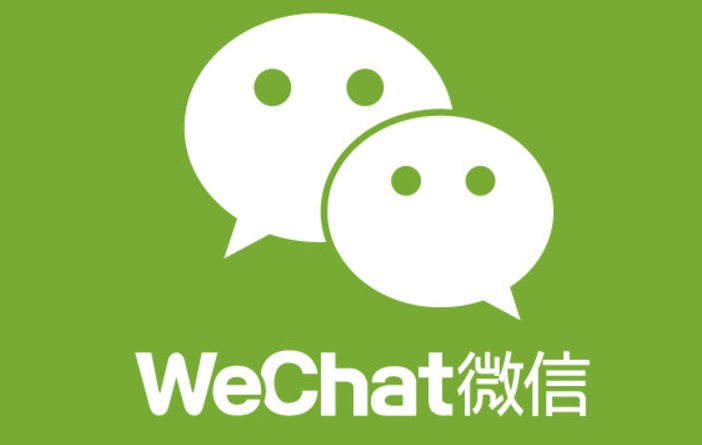
WeChat mobile messenger with an active audience of 700+ million people, i.e. almost the entire urban population of China. The absolute standard in China, has no weighty competitors.
There are many functions, as in any Chinese application, but the financial side is one of the key ones. The popularity of mobile payments bypasses Alipay a little. It is accepted almost everywhere, if not officially, at the personal account of the waiter or seller. It also works on QR codes, therefore it is supported by all devices.
The “red envelope” feature — the digital incarnation of a cash gift — is wildly popular. In China, money is presented in a red paper envelope for the new year, wedding, and other similar events.
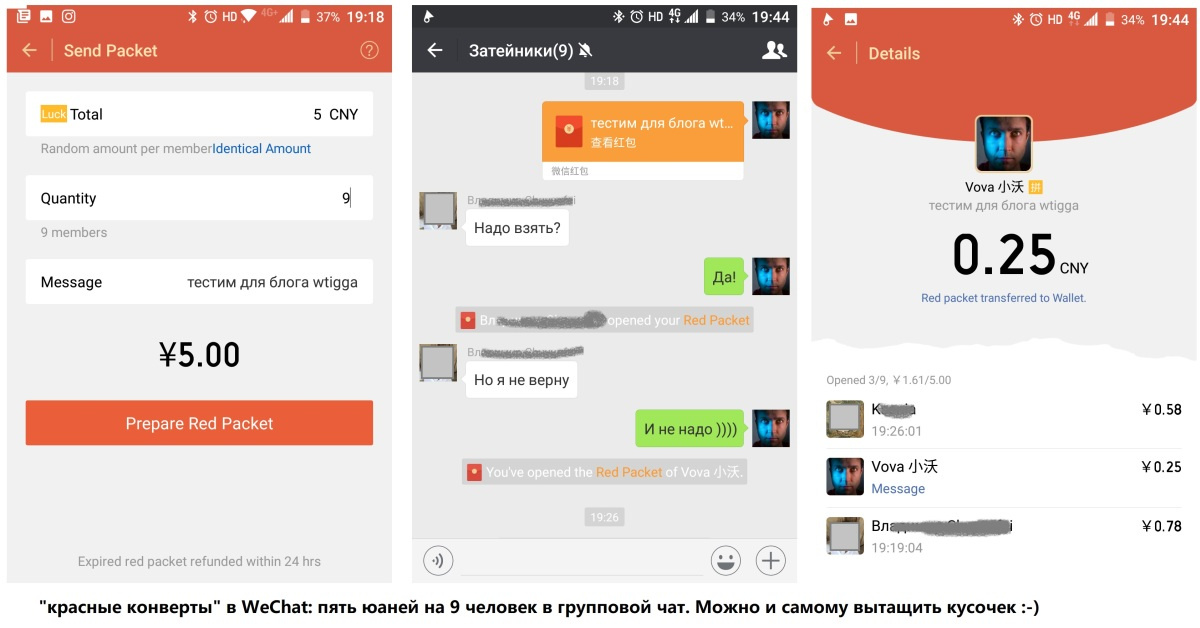
The digital envelope has gone far ahead. This is not just a "surprise message with money." For example, you can send an envelope divided into 10 equal parts to a chat group of 50 people: the one who taped first received it. And you can make 10 parts with a random amount each to add excitement. This game is loved by bosses in companies for the new year, sending gifts to group chats. For them, there is a struggle)
E-commerce - Taobao

In China, there is Taobao . The application and the site do not shine with performance, but the platform itself is amazing.
I literally do not go to stores for the past two years. Clothing, electronics, household goods, products, vegetables - I order everything there.

On Tao there is everything, from left to right: Russian army suhpay, Suzuki motorcycle, watermelons, Crocan sweets, iPhone 7
No fakes, if you turn the head, adequate prices, inexpensive delivery. And the choice: everything is there, well, everything is right, from Blackberry KEYone to Baltic sprats, from toilet paper to Australian cream.
Food - Ele.me
Food delivery Eleme (饿 了 么 - "hungry?"). Aggregator of all eateries and restaurants in the area. In the "residential area" of a large city, within the radius of delivery, hundreds of establishments for every taste will be available, with delivery within an hour. Even a small dumpling on three tables can connect there without any problems. Of course, this is not the only application, but very popular.
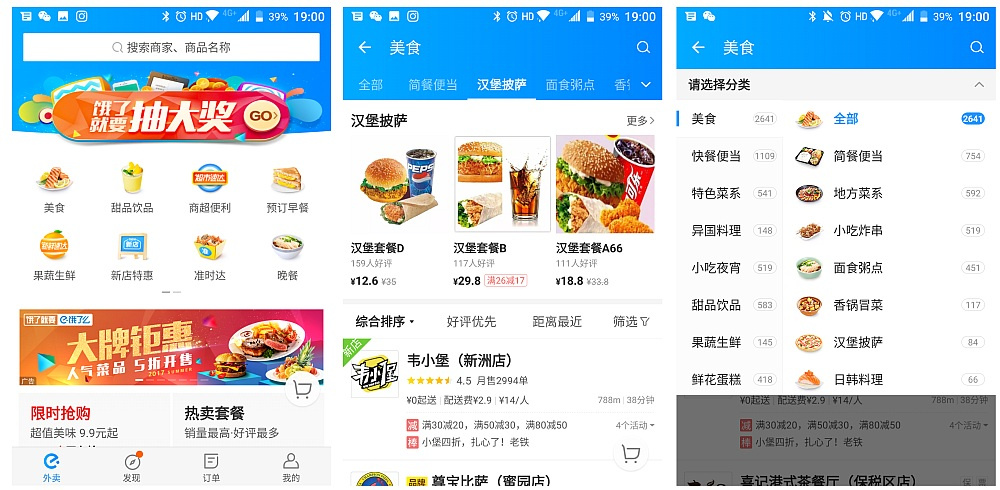 Tsiferki on the screenshot on the right - the number of institutions in the radius of delivery for each category. There is no problem with choosing food.
Tsiferki on the screenshot on the right - the number of institutions in the radius of delivery for each category. There is no problem with choosing food.Conclusion
Sorry, burst.
Source: https://habr.com/ru/post/370659/
All Articles